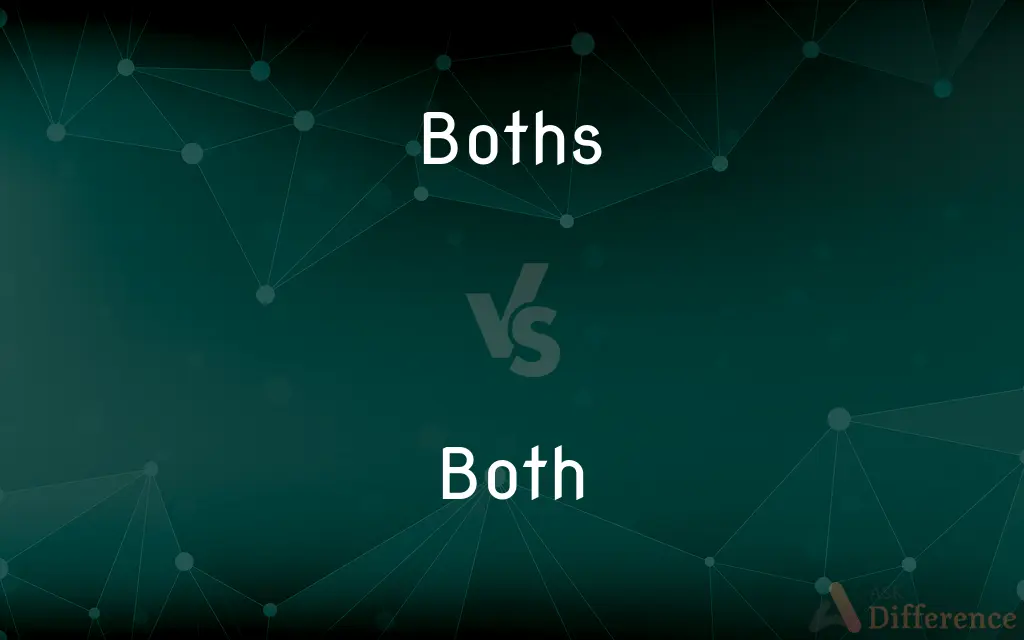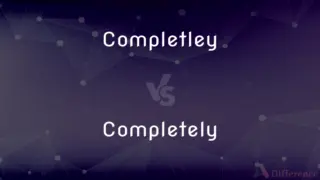Boths vs. Both — Which is Correct Spelling?
Edited by Tayyaba Rehman — By Fiza Rafique — Updated on March 26, 2024
"Boths" is incorrect; the correct spelling is "both," meaning the two specified items or people.

Table of Contents
Which is correct: Boths or Both
How to spell Both?

Boths
Incorrect Spelling

Both
Correct Spelling
ADVERTISEMENT
Key Differences
"Both" refers to two items/people, not more, so no need to make it sound plural with "s."
Similar words like "each" and "either" also don't use an "s" at the end.
Spell-check tools will highlight "boths" as an error.
Recite "both of them" to remember the correct form.
Remember it as a combination of "by" and "other" - "both."
ADVERTISEMENT
How Do You Spell Both Correctly?
Incorrect: Boths solutions seem viable.
Correct: Both solutions seem viable.
Incorrect: They will attend boths events this weekend.
Correct: They will attend both events this weekend.
Incorrect: We invited boths of them to the party.
Correct: We invited both of them to the party.
Incorrect: Boths of the cars are fast.
Correct: Both of the cars are fast.
Incorrect: She likes boths of the books.
Correct: She likes both of the books.
Both Definitions
Referring to two items or people.
Both students passed the exam.
Used with "and" to emphasize similarity or linkage.
Both a singer and an actor, he's multitalented.
Indicating a connection.
Arguments on both sides were compelling.
Used to describe effects on two items.
Both arms were injured.
Meaning not just one, but the two.
I like both chocolate and vanilla.
One and the other; relating to or being two in conjunction
Both guests have arrived. Both the books are torn. Both her fingers are broken.
Used with and to indicate that each of two things in a coordinated phrase or clause is included
Both men and women.
An attorney well regarded for both intelligence and honesty.
Each of the two; one and the other; referring to two individuals or items.
Both children are such dolls.
Which one do you need? – I need both of them.
Each of the two, or of the two kinds.
"Did you want this one or that one?" — "Give me both."
They were both here.
Including both of (used with and).
Both you and I are students.
(obsolete) Including all of (used with and).
The one and the other; the two; the pair, without exception of either.
She alone is heir to both of us.
Abraham took sheep and oxen, and gave them unto Abimelech; and both of them made a covenant.
He will not bear the loss of his rank, because he can bear the loss of his estate; but he will bear both, because he is prepared for both.
Thy weal and woe are both of them extremes.
This said, they both betook them several ways.
As well; not only; equally.
To judge both quick and dead.
A masterpiece both for argument and style.
To whom bothe heven and erthe and see is sene.
Both mongrel, puppy, whelp, and hound.
He prayeth well who loveth wellBoth man and bird and beast.
(used with count nouns) two considered together; the two;
Both girls are pretty
Both Meaning in a Sentence
Both of the movies were interesting.
Both teams played well, but only one could win.
Both of us are planning to go hiking tomorrow.
Both windows need to be closed before it rains.
Both options have their advantages and disadvantages.
Both of my friends have birthdays in July.
Both books contain useful information for the project.
Both cats are sleeping on the sofa.
Both children enjoy playing outside.
Both candidates have strong arguments for their campaigns.
Both pizzas were delicious, so we couldn't choose a favorite.
Both suggestions were considered during the meeting.
Both cars belong to my neighbor, but he uses them for different purposes.
Both subjects will be covered in today's lecture.
Both of them were awarded for their outstanding performance.
Both doors were locked, ensuring the house was secure.
Both answers are correct, but they require different approaches.
Both dogs barked when the visitors arrived.
Both the teacher and the students were excited about the field trip.
Both songs by the artist are topping the charts.
Both exercises target the same muscle groups.
Both cups were filled to the brim with coffee.
Both jackets are warm, but I prefer the blue one.
Both of these cookies taste amazing.
Both lamps in the room were turned on to brighten the space.
Both Idioms & Phrases
Both ends meet
Managing one's financial situation so as to neither owe money nor have extra.
It's been tough, but we're finding ways to make both ends meet.
In both ears
Listening attentively or being fully engaged in listening.
When she speaks, you can tell he's listening with both ears.
Both ways
Enjoying two benefits at once or being applicable in two different situations.
With this job, I can work remotely and travel, having it both ways.
Cut both ways
To have both positive and negative effects.
This policy could cut both ways, improving infrastructure but increasing taxes.
Both sides of the story
Considering all perspectives of a situation.
It's important to listen to both sides of the story before making a judgment.
Have both feet on the ground
To be realistic and practical.
Despite his success, he's always had both feet on the ground.
Swing both ways
To be attracted to or compatible with more than one option.
As for holiday destinations, I swing both ways between beaches and mountains.
Common Curiosities
Which vowel is used before both?
There isn't a specific vowel that always precedes "both."
Why is it called both?
"Both" comes from Old English "bā," meaning "both," which was influenced by "bā þā" meaning "both the."
What is the verb form of both?
"Both" does not have a verb form; it's a determiner or pronoun.
What is the pronunciation of both?
Both is pronounced as /boʊθ/.
What is the plural form of both?
"Both" doesn't have a plural form.
Which conjunction is used with both?
"And" is commonly used, as in "both... and..."
What is the root word of both?
The root of "both" is from Old English "bā."
Which preposition is used with both?
"Of" is commonly used, as in "both of."
Is both an adverb?
No, "both" is not an adverb.
Which article is used with both?
Typically, no article is used directly before "both."
What is the singular form of both?
"Both" doesn't have a singular form; it inherently refers to two items/people.
Is the both term a metaphor?
No, "both" is not typically used as a metaphor.
Is the word both is imperative?
No, "both" is not imperative.
How many syllables are in both?
"Both" has one syllable.
What part of speech is both?
"Both" is a determiner or pronoun.
What is the third form of both?
"Both" does not have verb forms.
What is a stressed syllable in both?
The entire word "both" is stressed, as it's a one-syllable word.
What is another term for both?
Another term could be "each of the two."
What is the second form of both?
"Both" does not have verb forms.
Is both a noun or adjective?
"Both" is a determiner or pronoun, not a noun or adjective.
Is both an abstract noun?
No, "both" is not an abstract noun.
Is both a negative or positive word?
"Both" is neutral; it's neither negative nor positive.
Is both a countable noun?
"Both" is not a noun, so it's not countable.
How is both used in a sentence?
"Both books are interesting to read."
How do we divide both into syllables?
"Both" is not divided; it's a one-syllable word.
What is the opposite of both?
There's no direct opposite, but "neither" refers to not one or the other of two.
Which determiner is used with both?
"Both" itself is a determiner.
What is the first form of both?
"Both" does not have verb forms.
Is both a vowel or consonant?
"Both" is a word, not a letter. It contains both vowels and consonants.
Is both a collective noun?
No, "both" is not a collective noun.
Share Your Discovery

Previous Comparison
Aproximately vs. Approximately
Next Comparison
Completley vs. CompletelyAuthor Spotlight
Written by
Fiza RafiqueFiza Rafique is a skilled content writer at AskDifference.com, where she meticulously refines and enhances written pieces. Drawing from her vast editorial expertise, Fiza ensures clarity, accuracy, and precision in every article. Passionate about language, she continually seeks to elevate the quality of content for readers worldwide.
Edited by
Tayyaba RehmanTayyaba Rehman is a distinguished writer, currently serving as a primary contributor to askdifference.com. As a researcher in semantics and etymology, Tayyaba's passion for the complexity of languages and their distinctions has found a perfect home on the platform. Tayyaba delves into the intricacies of language, distinguishing between commonly confused words and phrases, thereby providing clarity for readers worldwide.


































